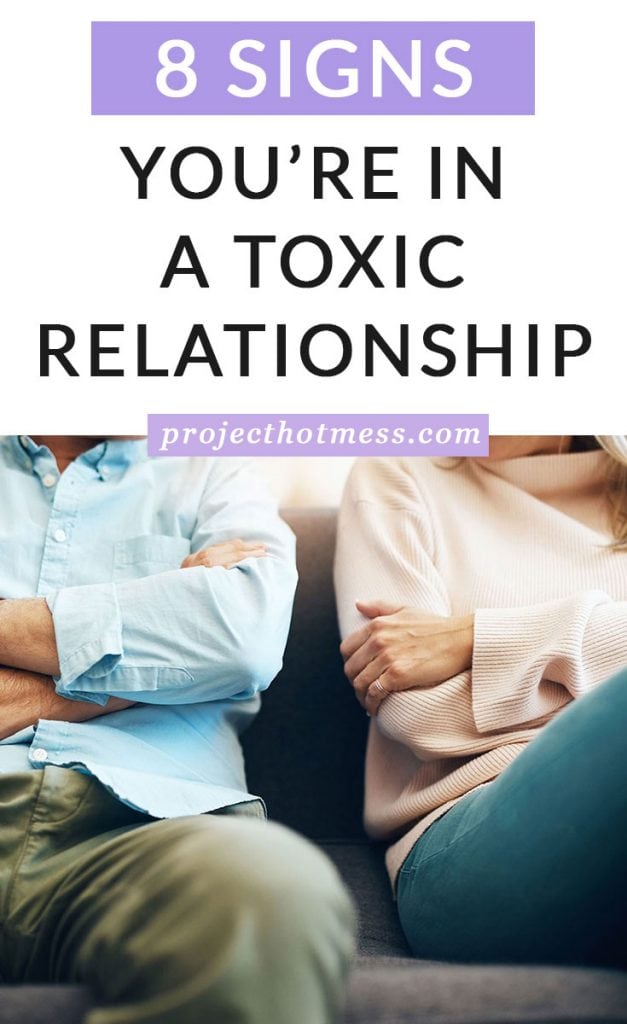11 Signs You’re In A Toxic Relationship (And What To Do About It)
It’s no secret that all relationships have their ups and downs. It’s just the natural flow of life. But if you’re finding your relationship has more time in the ‘down’ zone than the ‘up’, then this might be a sign you’re in a toxic relationship,
Too often people brush toxic relationships off as ‘normal’, and use the excuse that all relationships are hard work etc…
Usually, this is because we’re shown toxic behaviors in relationships all the time on TV and in movies, but rarely do they ever show a happy, healthy, well-functioning relationship with good communication and both partners having their needs met…
Of course, we see this because it’s all about the drama and healthy relationships aren’t exactly edge-of-your-seat-worthy entertainment. But they sure do feel good.
And yes, relationships do require work, but they shouldn’t be hard work, all the time.
Oftentimes dismissing toxic behaviors and turning a blind eye to red flags can take what was once a good relationship and turn it into an unhealthy relationship before you even realize just how bad it is.
Understanding these signs can help you to identify early if you’re in a toxic relationship or even if your relationship is showing some signs of toxic behavior, and allow you to reign it in and get some help before it’s too late.

11 Signs Of Toxic Relationships
As you read through these signs, keep in mind that we will all have a bad day or a negative moment from time to time – and for the majority of things on this list, that wouldn’t be a problem.
But if these aren’t occasional moments, and are more frequent, then that’s something you need to pay attention to.
This isn’t an exhaustive list, but is certainly some of the most obvious and commons signs you’re in a toxic relationship:
1 – You’re Not Happy
Everyone has unhappy days, days when they’re sad, emotional, exhausted, over it… but if these days are the majority of your days, and you’re struggling to find happiness in your relationship, then this can be a sign there’s something going on in your relationship that you need to address.
Happiness is important in any relationship – after all, why be in a relationship that doesn’t make you happy?
Of course, it’s not always possible to be happy ALL the time but if you find your happiness is being sucked out of you by your partner or by your relationship, then this is definitely something to take notice of.
Your relationship should make you happy, it should make you smile and it should make you feel good.
If you’re not happy when you’re thinking about your relationship then this is a sign of a bigger problem.

2 – You Can’t Talk Without Fighting
There’s this belief that all couples fight, but this is not true at all.
Of course, all couples will have disagreements and there will be times when things get heated between you – but if this is the only way you can communicate with each other and every conversation turns into a fight, then something is definitely wrong.
A toxic person can take a disagreement that can easily be discussed in a healthy way, and turn it into an argument, and if you’re in a relationship with a toxic person, then you might find your disagreements often head in this direction.
Couples who don’t fight are often thought of as being in a ‘boring’ relationship, but the truth is, these couples have just learned how to communicate with each other effectively.
In a healthy relationship, both partners feel safe enough to share their thoughts and feelings without feeling like they’re going to be attacked or ridiculed. They can openly express themselves without fear of judgment or criticism.
Some couples argue, and this is completely different. You can disagree on a topic, argue your point and still have a respectful conversation. When you’re fighting, there is no respect at all and no regard for the way you make your partner feel.
Fighting is meant to make the other person feel bad, often uses name calling, bringing up past issues in your relationship, and is used as an attack. This is certainly not how you should ever treat someone you love and care for.
If you’re constantly fighting with your partner, and you’re unable to have a calm conversation without it turning into an argument, then this is definitely a sign of a toxic relationship.
Note On Abusive Relationships
There are some relationships that go beyond fighting and lead to verbal abuse, physical abuse, and even emotional abuse. This kind of abusive relationship needs professional help, a lot of intentional work, and strong emotional support.
This kind of abusive behavior is not simply a ‘rough patch’ but rather a major red flag that cannot be ignored.
Be mindful, this includes any kind of abuse, as many people are quick to dismiss abusive behaviors that aren’t physical.
If you are in an abusive relationship, please reach out to your National Domestic Violence Hotline – they can help put you find resources and strategies to help you.

3 – You Avoid Sharing How You Feel
Do you avoid sharing your own feelings with your partner because you’re worried about how they will react?
Are you concerned that by sharing your true feelings on a particular issue, they will judge you, mock you, or think of you differently?
If the answer to these questions is yes, then this is a sign of a very toxic relationship.
You should never have to worry about how your partner will react when you share your feelings with them – they should be someone you feel safe enough to open up to and express yourself around.
The ability to openly communicate with each other is one of the most important aspects of a healthy relationship.
When you’re unable to do this, it creates a barrier between you and your partner that can be very difficult to overcome.
This can also be true if you do share how you feel and your partner shows a lack of empathy, or a complete disregard for you and how you feel.
Your partner forms a big part of your support system and being able to be open and honest with them on a regular basis is a foundational part of a healthy relationship.
You should always feel confident to share how you feel, knowing that you will be heard, loved, and respected.
If you don’t have this kind of relationship, then you may need to look at why that is, and ask yourself what you can do to create this.

4 – Everything Is A Competition
A little competitiveness in a relationship can be fun, but if everything you do turns into a competition, then this could be a sign that you’re in a toxic relationship.
This is most prevalent in the ‘tit for tat’ type situations, where there’s fighting about who does more, who is more tired, who is more xyz.
This can happen with couples who have very different work schedules, or who have different levels of energy.
Trying to keep up with each other and always being in competition can be exhausting, and often leads to resentment.
It’s important to be able to take a step back and remember that you’re on the same team, not competing against each other.
A healthy relationship is one where you can both be yourselves, without feeling like you have to continuously outdo each other.
If you’re finding that everything is a competition, then this is something you should talk to your partner about, and try to find a way to create some healthy boundaries and work together rather than against each other.

5 – When You Feel You Can’t Say No
No is an important word in any relationship.
It creates boundaries, it allows for freedom to express yourself and it allows you to be able to pull back and retreat to your own safety.
In most relationships, this can be as simple as saying ‘no’ to going out to dinner with friends, because you are tired from work and would rather stay home and rest, or saying ‘no’ to intimacy because you’re not in the mood.
In a toxic relationship, ‘no’ can feel like a four-letter word and this becomes toxic when you feel like you can’t say ‘no’ for fear of response or repercussion.
You may find that you’re unable to say no to anything your partner asks of you, whether it’s something small or something big.
This could be because you’re worried about their reaction, or you don’t want to upset them, or because when you have said no previously, they show passive-aggressive behavior and make you feel guilty.
In a healthy relationship, both partners should feel comfortable enough to say ‘no’ when they need to, without fear of retribution or feeling like they have to explain themselves.
If you’re finding it difficult to say ‘no’, then this is something you need to talk about with your partner or even in couples therapy, and try to find a way to create a healthy boundary around this.

6 – You Feel Like You’re Always Walking On Eggshells
Do you feel like you have to gauge your partner’s mood before you engage in a conversation with them? Or do you feel like if you say or do the wrong thing they will just go off?
Walking on eggshells is not a nice feeling and is a sure sign of toxicity in a relationship.
There’s a big difference between not wanting to upset someone, and fearing that you will say the wrong thing and your partner will go off. The first is healthy and the latter is not.
When you’re walking on eggshells, you’re constantly monitoring your words and actions, and this can be exhausting.
It also stifles any opportunity for intimacy or connection, as you don’t feel safe enough to truly be yourself.
If you’re feeling like you have to tip-toe around your partner all the time, then this is something you need to talk about with them.
It’s important to remember that you should be able to be yourself in a relationship, without feeling like you have to monitor everything you say and do.
If you’re finding that you’re always walking on eggshells, then this is something you need to address with your partner, and try to find a way to move forward where you can both feel more comfortable and secure.

7 – You Feel Like You’re Not Heard
A relationship is an equal partnership and as such, you have an equal voice and opinion.
You should feel like you’re able to express yourself and be heard, without feeling like you’re being shut down or dismissed.
Your thoughts, feelings, concerns, aspirations, and goals should all be heard and acknowledged.
In a toxic relationship, one partner may feel like they are constantly fighting to be heard and their opinion always seems to come last.
This can lead to feelings of resentment and frustration, as well as a sense that your opinion and voice don’t matter.
This can also manifest in ways where you feel like you’re the one always meeting your partner’s needs, but your needs aren’t being met (or aren’t even known).
If you feel like you’re not being heard, and your relationship is one-sided, then this could be a sign of something more sinister.
A toxic relationship starts with discontentment, and this is one of those subtle signs that start out small and can build into something far more toxic.

8 – You Just Don’t Care
If you’ve reached a point in your relationship where you just don’t care, then you’re most likely in the toxic relationship territory.
This is toxic for not only your relationship but also for your own happiness and well-being.
Relationships require 100% effort. They aren’t something you can half commit to and expect to have a happy and successful relationship.
It’s up to you to choose whether or not you’re willing to put 100% effort in or not. And if it’s your partner that isn’t putting in the effort, then you can’t make them. It’s their choice.
A relationship where one person just doesn’t care is toxic and you both deserve to be in happy, healthy relationships where you are excited to give 100%.
This can often happen when there’s a lack of support from your romantic partner, where your emotional needs aren’t being met, or when the idea of making the relationship work just seems like too much effort.
If you find that you just don’t care about your relationship anymore, then this is definitely something to pay attention to.
It’s one of the most telling signs that things aren’t going well and that your relationship might be toxic.

9 – You Don’t Trust Your Partner
Lack of trust in a relationship is a common problem, and it can be difficult to overcome.
If you don’t trust your partner, then this will undoubtedly have an effect on every other aspect of your relationship.
It’s hard to be emotionally intimate with someone when you don’t trust them, and it’s hard to feel secure in a relationship when there’s no trust.
Oftentimes trust issues can arise from previous experiences you’ve had in bad relationships – such as having a partner cheat on you or lie to you, or from behaviors your partner has exhibited in your current relationship.
Trust is essential for a happy and healthy relationship to exist.
If you don’t trust your partner, then it can be very difficult to move forward in any kind of meaningful way.
You need to feel like you’re able to rely on them, and that they have your best interests at heart.
If you have issues with trust in your relationship, the good news is that seeing a professional counselor or going to couples therapy can help a lot in these situations and can help you to find ways to gain trust in your relationship again.

10 – You Don’t Communicate With Each Other
They say communication is key in any relationship, and that’s definitely true.
If you’re not communicating with your partner, then it’s very difficult to connect with them on an emotional level, and it can be difficult to resolve any problems or issues you may have.
It’s important to be able to openly communicate with your partner about your thoughts, feelings, and needs.
If you’re not doing this, then it can be a sign that you’re holding back in the relationship, which can lead to resentment and other problems further down the line.
It’s also important to be able to listen to your partner when they’re communicating with you. This can be just as difficult as communicating yourself, but it’s essential for a successful relationship.
If you’re not listening to your partner, then you’re not really hearing what they’re saying, and you’re not giving them the opportunity to be heard. This can lead to a feeling of disconnection and isolation in the relationship.
Good communication requires active listening.
Even in disagreements, hearing what each other has to say and talking through issues is incredibly important.
If you find you’re on the receiving end of the silent treatment (or if you’re giving it out) after an issue arises, then you need to look at why these unhealthy behaviors exist in your relationship.
Almost all types of toxic relationships have some form of communication problem in them.
Communication isn’t always something we do well, or do naturally, so taking the time to learn good communication skills and simply spending time talking to each other can go a long way in overcoming communication issues.

11 – You’re Not In It Together
Do you feel like you’re in a one-sided relationship? Like you’re less like partners and more like roommates?
If so, then this is another sign that things aren’t going well.
A relationship should feel like a partnership – like you’re in it together, working towards common goals.
Many people in healthy relationships describe their partner as their best friend, someone they genuinely want to be around and who they know has their back, is their biggest supporter, and who they can rely on.
If you’re finding a lack of cohesiveness in your relationship, you might need to take a step back and ask yourself why.
It might be that there’s an imbalance in the relationship, and one person is doing more than the other. It might be that you’re not working together towards common goals, or it might be that you have different values and priorities.
Whatever the reason, if you’re not feeling like you’re in a partnership, it’s something you need to address.
Being in a relationship should make you feel good about yourself, and should make you feel supported, loved, and valued.
If it’s not doing that, then it might be time to reevaluate things.

What To Do When You’re In A Toxic Relationship
Despite what you may think, being in a toxic relationship doesn’t always mean the relationship isn’t salvageable (with the exception of abusive relationships).
Oftentimes a relationship has just ignored and not addressed a problem that has arisen, and that toxicity has started to overflow into different areas.
The good thing is, with a little (or sometimes a lot) of effort, many relationships can be saved.
If you’re in a toxic relationship and you want to try and salvage things, here are some steps you can take:
1 – Acknowledge That The Relationship Is Toxic
The first step is always acknowledging that there’s a problem.
If you’re in denial about the toxicity of your relationship, then it will be impossible to make any changes or take any steps towards getting out of it.
Find the toxic part of your relationship and acknowledge it and why it is toxic so you know exactly what you’re dealing with.
2 – Talk To Your Partner About Your Concerns
If you’re worried that your relationship is heading down the wrong path, talk to your partner about it.
Let them know what your concerns are and why you think the relationship might be toxic.
Be honest, but also be respectful. This isn’t a time for finger-pointing or the blame game, but rather a time for an honest and open discussion about the state of your relationship.
Chances are they were probably feeling the same way but didn’t want to address the issue either.

3 – Work Together To Find A Solution
Once you’ve both acknowledged that there’s a problem, it’s time to start working together on a solution.
This might mean going to couples’ therapy, reading books on communication or relationships, or simply spending more time talking to each other about your relationship and how you’re feeling.
The important thing is that you’re both committed to finding a solution and willing to put in the work to make it happen.
4 – Set Some Ground Rules
If there are certain behaviors that are causing toxicity in your relationship, then it might be helpful to set some ground rules about them.
For example, if one person is always interrupting the other, you might agree that whoever is talking gets to finish their thought without interruption.
Or if one person is always putting the other down, you might agree that there will be no more put-downs, name-calling, or belittling language used.
In this case, be sure to give this behavior a name – emotional abuse – and don’t dismiss or diminish its severity. It’s also a good idea to get some professional help in these areas as they can help address why these behaviors arose in the first place.
Setting some ground rules can help to stop toxic behavior in its tracks and give you both a way to hold each other accountable.

5 – Take A Break If You Need To
Sometimes the best solution is to take a break from each other, whether that means spending some time apart or even breaking up temporarily.
This can be a difficult decision to make, but sometimes it’s necessary in order to address the toxicity in the relationship.
It can be a chance to take some time for yourselves, work on your own issues, and come back together when you’re both in a better place.
6 – Seek Professional Help
If you’re struggling to make changes in your relationship on your own, it might be time to seek professional help.
This could be in the form of couples therapy, individual therapy, or even relationship coaching.
A professional can help you to identify the toxic patterns in your relationship and give you some tools and strategies for addressing them.
7 – Make A Decision About The Future Of The Relationship
Once you’ve done all of the work to try and salvage your relationship, it’s time to make a decision about its future.
This is a difficult decision to make, but sometimes it’s necessary in order to protect your own well-being.
If you’ve tried everything and nothing has worked, then it might be time to consider ending the relationship.
However, this decision should only be made after careful consideration and reflection. Be sure to seek professional help if you’re struggling to make this decision.

Final Thoughts
If you’re in a toxic relationship, it’s important to take action to address the issue.
Talk to your partner about your concerns (if you feel safe doing so) and work together to find a solution. If the toxicity is too much, don’t be afraid to take a break or even end the relationship.
And finally, seek professional help if you need it. Toxic relationships can be incredibly damaging, so it’s important to get help if you’re struggling.








